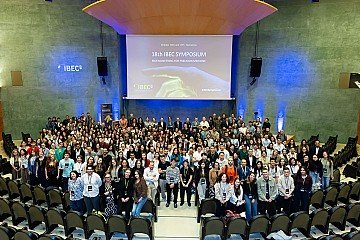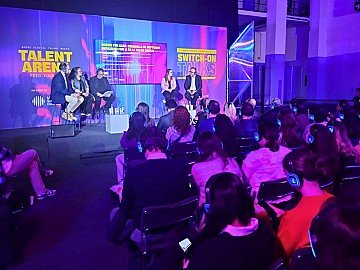IBEC’s 17th Annual Symposium focused on ‘Bioengineering for Emergent and Advanced Therapies’, one of IBEC’s key application areas. Around 300 people attended the event, including local and international researchers. It was a multidisciplinary environment in which experts from other centres and the IBEC community itself had the opportunity to present their projects and share knowledge.
The 17th IBEC Symposium was held on Tuesday 22 October. The event, aimed specifically at the IBEC community but open to the wider scientific community, was attended by around 300 people who were able to learn about the latest developments in bioengineering for emergent and advanced therapies.
Gal-la Vinyes and Janet van der Graaf, researchers from IBEC’s Nanobioengineering and Integrative Cell and Tissue Dynamics groups respectively, were the masters of ceremonies for the symposium. The day began with a welcome from representatives of IBEC’s founding institutions: Laia Arnal, Director General for Knowledge Transfer and Society at the Department of Research and Universities of the Catalan Government; Jordi Llorca, Vice-Rector for Research at the Polytechnic University of Catalonia (UPC); Joan Guàrdia, Rector of the University of Barcelona (UB); and Josep Samitier, Director of IBEC.
IBEC is in a place for exploring new and unknown worlds, searching for new forms of knowledge, until we reach places where no one has been before.
Josep Samitier
Participants emphasised the benefits of interdisciplinary scientific collaboration, a cornerstone of IBEC.
As usual, Samitier kicked off the series of talks with a presentation giving a comprehensive overview of IBEC’s achievements over the past year and the future direction of the Institute, reaffirming its commitment to research excellence and biomedical innovation. Inspired by the popular ‘Star Trek’ series, Samitier said that IBEC is in a place for ‘exploring new and unknown worlds, searching for new forms of knowledge, until we reach places where no one has been before’.
Science is always worth doing because sooner or later the discoveries will have an application.
Núria Montserrat
During the event, the occasion was used to celebrate the fact that earlier this year IBEC received the Severo Ochoa Accreditation for Excellence for the third year in a row. The event was attended by the Hon. Núria Montserrat, IBEC’s former director and now the Catalan Government’s Minister for Research and Universities. Montserrat congratulated IBEC on this third award and quoted Severo Ochoa himself: ‘Science is always worth doing because sooner or later the discoveries will have an application,’ she said.
Biotechnology for New and Advanced Therapies
This year there were four presentations by leading researchers in the field of biotechnology for new and advanced therapies.
The first was Valentina Basoli, a researcher from the Department of Biomedical Engineering at the University of Basel (Switzerland), who presented the latest advances in bone and cartilage regeneration using 3D printing and the use of biosensors to monitor cell behaviour, as well as addressing the challenges of donor variability in regenerative treatments.
Basoli concluded his presentation by saying that “there is no innovation without collaboration between physicians, biologists and technologists”.
Pere Roca-Cusachs, Deputy Director of the Intramural Scientific Programme, then presented IBEC’s Thematic Networks, an initiative to promote internal collaboration between the Institute’s research groups.
There is no innovation without collaboration between physicians, biologists and technologists.
Valentina Basoli
The next speaker was Twan Lammers from RWTH Aachen University (Germany), who outlined strategies to improve the performance and clinical translation of nanomedicine against cancer. Methods to optimise drug accumulation in tumours through image guidance and blood vessel modification were discussed, as well as the use of biomarkers to select the most appropriate patients.
Next up was IBEC graduate and current production manager in the pharmaceutical industry, Veronica Hortigüela. During her presentation, Hortigüela talked about her personal example: the journey from academia to the pharmaceutical company and gave some advice to people interested in making this leap into the industry.
Technical skills developed through years of scientific research can open doors in the pharmaceutical industry. Soft skills will make the difference.
Veronica Hortigüela
‘Technical skills developed through years of scientific research can open doors in the pharmaceutical industry. Soft skills will make the difference,’ said Hortigüela.
The fourth and final presentation was given by Tae-Eun Park, a senior researcher in the Department of Biomedical Engineering at the National Institute of Science and Technology in Ulsan, South Korea. Park presented a microphysiological system that mimics the blood-brain barrier to identify aptamers capable of efficiently crossing it. This technology facilitates the development of new drug delivery strategies to the brain and other organs.
Recognition for work done
The day ended with an awards ceremony.
Four PhD students were honoured with Certificates of Doctoral Excellence: Celia Ximenes and Marina Martínez, from the Biomaterials for Regenerative Therapies group; Shubham Tanwar, from the Nanoscale Bioelectrical Characterisation group; and Meritxell Serra, from the Smart nano-bio-devices group.
Of these, Meritxell Serra Casablancas won the ‘IBEC Doctoral Prize’ in recognition of the best performance and achievements during her PhD studies at IBEC. Serra completed her thesis on ‘Design and evaluation of enzyme-driven nanobots to cross biological barriers and treat cancer’ under the supervision of Samuel Sánchez.
Another activity that has been part of the symposium since its inception, and which fosters links between researchers, is the poster session. Of the more than 100 posters presented, the best poster award went to Pau Guillamat, a postdoctoral researcher in the IBEC Integrative Cell and Tissue Dynamics group led by Xavier Trepat, for her poster on “Guidance of cellular nematics into self-shaping active surfaces”.


